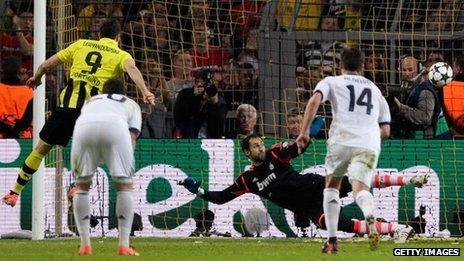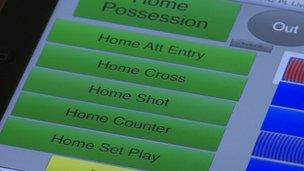Football's top teams tap into burgeoning data bonanza
- Published
Richard Taylor looks at how technology is changing football training
Half-time football team talks used to be based around eating oranges. Now they can analyse real-time data and react to presentations.
Football has become a numbers game.
There is still a huge debate in the game about the use of goal-line technology, but for everything behind the scenes it seems like that battle has already been fought and technology won.
It is no longer just 2-0, 1-3 or - if you are a Barcelona supporter - 4-0 but all about a near-infinite number of figures.
Possession, territory, passes completed, the list goes on and on and on.
It's only a very dedicated football fan who would know that Bayern Munich midfielder Javi Martinez won an average of 2.6 balls in the air during each Uefa Champions League game so far this season.
But processing this kind of data gives teams a great advantage, both in training and matches.
For goalkeepers, the guess of where a penalty might go is now a mathematical algorithm rather than an instinct.

The goalkeeper will know where the taker has placed previous penalties
If a player has hit 95% of his penalties to one side of the goal, which way do you think the goalkeeper is going to dive?
What this means is that the millions of pieces of data created must be analysed by teams.
Manchester City, for example, have 10 analysts working full-time on analysing data, four just for the first team, so that no stat that counts - or at least worth counting - is left unanalysed.
Pick geeks first
City defender Vincent Kompany has initiated a meeting with fellow defenders and the analysts once a week to discuss the data.
The club have even experimented with making all this information public and, because of how popular it has been, are expected to resume this next season.
There was a time, not too long ago, when teams in school playgrounds were picked and the ones left towards the end of selection were often those more at home in front of a computer screen than in front of goal.
Now Premier League clubs are picking them first.
"We've got a record for every shot across the top few leagues for the last five years," says Sam Green, advanced data analyst at sports data company Opta.
"Beyond penalties, the tendency for people to shoot under certain circumstances and where that shot was from."
"A lot of things can be done with the data. Some of the things we use it for is to look at how teams react to corners or other set pieces. How likely are they to concede a shot on a counter-attack afterwards?"
But there are limits to how far data can take you, particularly with the often distracted or influenced mind of a footballer.
Intent
"I don't think any club is at a stage where they can use data comprehensively across every aspect of the game," says Mr Green.
"There are things that we're not confident in predicting - which way they would turn, for example.
"There's still an issue of intent. The shot went in the top left-hand corner but we don't know necessarily that it's where the striker was trying to put the ball."
What is often forgotten about the current data "revolution" - as some people call it, external - is that recording the information of football matches goes back a long way.
RAF pioneer
"Soccer is the original hotbed of analytics," Prof Chris Anderson, of Cornell University, and author of The Numbers Game, said., external
"There was an accountant and RAF wing commander by the name of Charles Reep who starting notating football games in 1950.
"He develops a coding system, sits down at matches and does it for 60 years."

The games must still be recorded manually as automation is difficult in such a complex game
"His work has informed how [data] has reverberated in clubs through the years.
"He notated with his own system all the events on the pitch and collected reams of data that he put into practice working with clubs in the 1960s, 70s and 80s. He was the original soccer analyst."
Mr Reep, through his findings, has been cited as one of the main architects of the long-ball game.
Another man with a reputation as a long-ball manager, Sam Allardyce, is seen as one of the main advocates of modern data use.
Mystery
Beginning in 2000 with a change in approach at Bolton, a company called Prozone was enlisted to provide detailed statistics that Allardyce has quoted and used time and time again.
He believes his use of modern techniques improves performance in a way that can be measured.
But even his data use is a mystery to some managers. One, seen as a modern, progressive coach, is critical of the reliance of statistics at all.

In a similar way to football broadcasts, video is now a key part of feedback from coaches
"I have never used Prozone. I don't use it because I don't believe [in it]," Tottenham Hotspur manager Andre Villas-Boas said in a press conference.
"You always have to be very, very careful with statistics. It doesn't mean that we negate them completely - we just don't use them to the extent that people might think.
"We have a scientific department that deals with that but we don't prepare our training or players based on the physical data we get from matches.
'Different approaches'
"The mind and how the player feels is much more important for us, rather than statistical data.
"For me it's useless but it varies from coach to coach. We all have different approaches."
For a manager seen as one of the world's new breed of technically astute managers, it seems like the numbers do not add up.
If that's the case, he probably does not even know how many balls Javi Martinez has won in the air.
Find out more on the Click homepage. If you are in the UK you can watch the whole programme on BBC iPlayer.
- Attribution
- Published28 April 2013
- Attribution
- Published18 October 2012
- Published1 March 2012
- Published29 April 2013